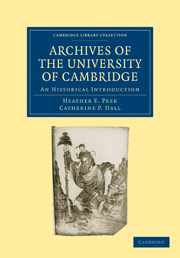2 - The Registers
Published online by Cambridge University Press: 07 September 2010
Summary
The sixteenth century opened in the universities with a burst of administrative activity and of reform in the keeping of administrative records. A second period of expansion took place between 1540 and 1550. As a result, there arose the third great group of university documents (after the charters and deeds of property), the registers', and with them a new officer whose duty it was to keep them, the registrary. Similar developments took place in Oxford, some slightly before, some slightly after, their Cambridge equivalents, so that in this matter at least Cambridge was not merely following the lead of the senior university.
At Cambridge, the year 1501 is the starting-point for the changes, and perhaps it is not a coincidence that John Fisher became vice-chancellor in that year. Certainly he was a skilled administrator and had personal knowledge of the keeping of university records from his proctorship. Up to this time there had been only one series of registers, the ‘Registra Procuratorum’, kept by each pair of proctors during their year of office. Although primarily financial records, these Registra’ had contained a considerable amount of other matter, Graces for degrees, the ‘Ordo Senioritatis ‘, and acts of the senate. In 1501 it was decided that the Registra’ should be confined to matters financial, while the Graces of the senate, the Ordo and similar acts should be entered in a new book. Thus was inaugurated the series of Grace Books proper.
- Type
- Chapter
- Information
- Archives of the University of CambridgeAn Historical Introduction, pp. 6 - 14Publisher: Cambridge University PressPrint publication year: 1963First published in: 1962



